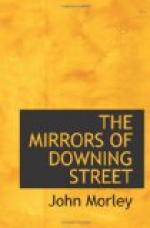A story told of one of his journalists illustrates the difficulty of dealing with so uncertain a person. Lord Northcliffe invited this journalist, let us call him Mr. H., to luncheon. They approached the lift of Carmelite House, and Lord Northcliffe drew back to let his guest enter before him—he has excellent manners and, when he is a host, is scrupulously polite to the least of people in his employment. Mr. H. approached the lift, and raising his hat and making a profound bow to the boy in charge of it, passed in before Lord Northcliffe. Nothing was said during the descent. On leaving the lift Mr. H. again raised his hat and bowed low to the boy. When they were out of earshot Lord Northcliffe remonstrated with him on his behaviour. “You shouldn’t joke,” he said, “with these boys, it makes discipline difficult.” “Joke!” exclaimed Mr. H., “good heavens, I wasn’t joking; how do I know that to-morrow he will not be the editor of the Daily Mail?”
This story has a real importance. It emphasizes a remarkable characteristic of Lord Northcliffe’s variability. It emphasizes the romantic quality of his mind. Nothing would please him more than to discover in one of his office boys an editor for The Times. His own life has given him almost a novelette’s passion for romance. He lives in that atmosphere. Few men I have known are so free from snobbishness or so indifferent to the petty conventions of society. The dull life of the world is hateful to him. He would make not only the journalism of the suburbs sensational, he would make the history of mankind a fairy-story.
It is difficult to understand his power in the world. He is not the great organizer that people suppose; all the organization of his business has been done by Lord Rothermere, a very able man of business; nor is he the inspirational genius one is so often asked to believe. Mr. Kennedy Jones is largely responsible for the journalistic fortunes of Lord Northcliffe.
I am disposed to think that it is the romantic quality of his mind which is the source of his power. All the men about him are unimaginative realists. He is the artist in command of the commercial mind, the poet flogging dull words into a kind of wild music. Mr. Kennedy Jones could have started any of his papers, but he could never have imparted to them that living spirit of the unexpected which has kept them so effectually from dulness. Carmelite House could give the news of the world without Lord Northcliffe’s help, but without his passion for the twists and turns of the fairy-story it could never have presented that news so that it catches the attention of all classes.




